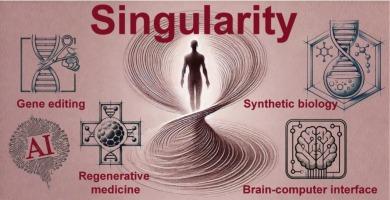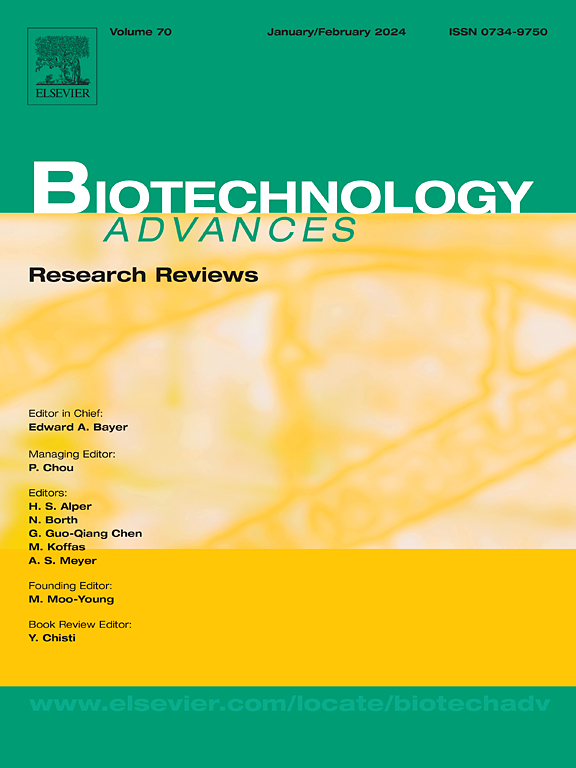生物技术奇点之路:当前的突破与展望
IF 12.5
1区 工程技术
Q1 BIOTECHNOLOGY & APPLIED MICROBIOLOGY
引用次数: 0
摘要
在基因编辑、合成生物学、人工智能、再生医学和脑机接口快速发展的推动下,生物技术正在接近一个通常被称为生物技术奇点的变革时代。基于crispr的基因编辑已经彻底改变了基因工程,使精确的基因修饰能够用于治疗遗传性疾病和癌症。合成生物学促进可持续的生物材料生产和创新的治疗应用。人工智能加速药物发现,提高诊断准确性,并通过深度学习模型个性化治疗。在干细胞研究的推动下,再生医学为逆转衰老和治疗退行性疾病提供了有希望的途径。脑机接口将人类认知与技术相结合,实现了对假肢的直接神经控制,扩大了人机交互。然而,这些突破引起了伦理、监管和社会方面的关注,包括公平获取、生物安全风险以及人类增强的影响。生物和计算技术的融合挑战了传统的边界,需要全面的治理框架。通过接受负责任的创新,社会可以利用这些进步进行变革性卫生干预、环境可持续性和延长寿命。生物技术奇点的实现依赖于科学家、政策制定者和公众之间的跨学科合作,以确保进步与人类福祉和伦理考虑保持一致。本文章由计算机程序翻译,如有差异,请以英文原文为准。

The path to biotechnological singularity: Current breakthroughs and outlook
Fueled by rapid advances in gene editing, synthetic biology, artificial intelligence, regenerative medicine, and brain-computer interfaces, biotechnology is approaching a transformative era often referred to as biotechnological singularity. CRISPR-based gene editing has revolutionized genetic engineering, enabling precise modifications for treating hereditary diseases and cancer. Synthetic biology facilitates sustainable biomaterial production and innovative therapeutic applications. Artificial intelligence accelerates drug discovery, enhances diagnostic accuracy, and personalizes treatment through deep learning models. Driven by stem cell research, regenerative medicine offers promising avenues for reversing aging and treating degenerative diseases. Brain-computer interfaces merge human cognition with technology, enabling direct neural control of prosthetics and expanding human-machine interactions. These breakthroughs, however, raise ethical, regulatory, and societal concerns, including equitable access, biosecurity risks, and the implications of human enhancement. The convergence of biological and computational technologies challenges traditional boundaries, necessitating comprehensive governance frameworks. By embracing responsible innovation, society can harness these advancements for transformative health interventions, environmental sustainability, and extended longevity. The realization of biotechnological singularity depends on interdisciplinary collaboration among scientists, policymakers, and the public to ensure that progress aligns with the well-being of humanity and ethical considerations.
求助全文
通过发布文献求助,成功后即可免费获取论文全文。
去求助
来源期刊

Biotechnology advances
工程技术-生物工程与应用微生物
CiteScore
25.50
自引率
2.50%
发文量
167
审稿时长
37 days
期刊介绍:
Biotechnology Advances is a comprehensive review journal that covers all aspects of the multidisciplinary field of biotechnology. The journal focuses on biotechnology principles and their applications in various industries, agriculture, medicine, environmental concerns, and regulatory issues. It publishes authoritative articles that highlight current developments and future trends in the field of biotechnology. The journal invites submissions of manuscripts that are relevant and appropriate. It targets a wide audience, including scientists, engineers, students, instructors, researchers, practitioners, managers, governments, and other stakeholders in the field. Additionally, special issues are published based on selected presentations from recent relevant conferences in collaboration with the organizations hosting those conferences.
 求助内容:
求助内容: 应助结果提醒方式:
应助结果提醒方式:


